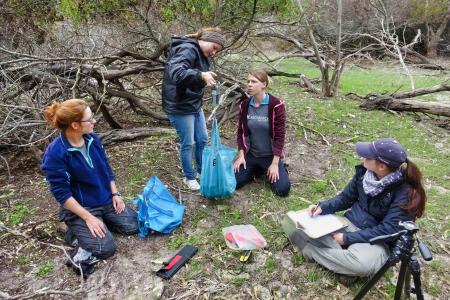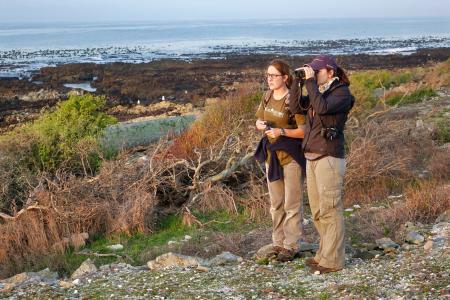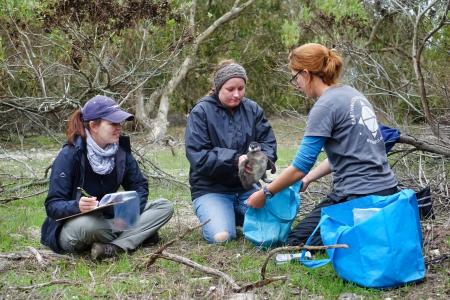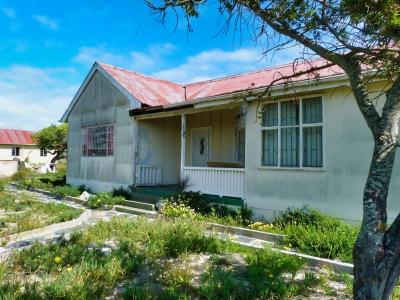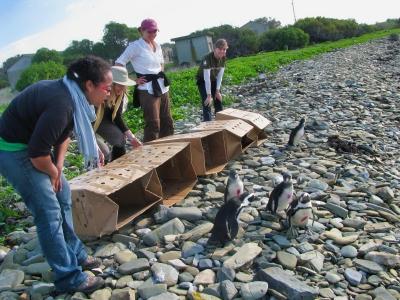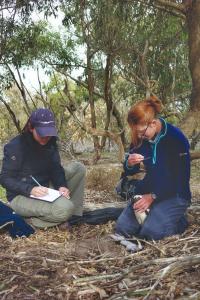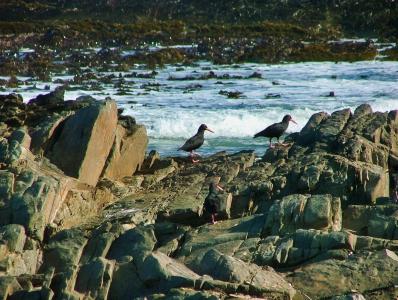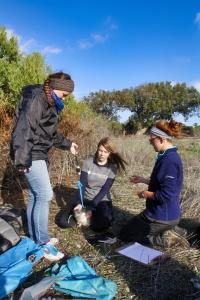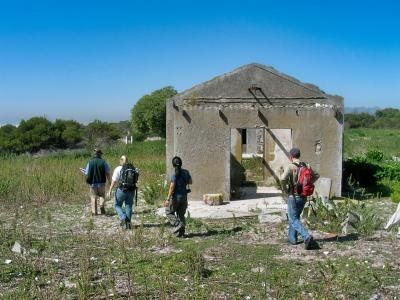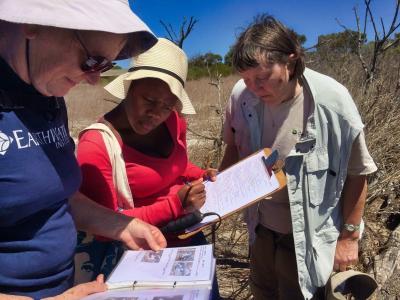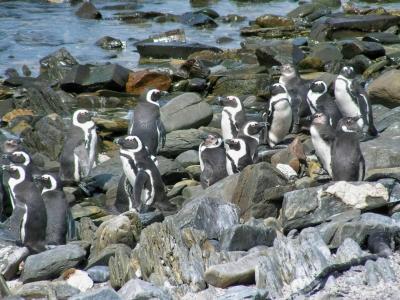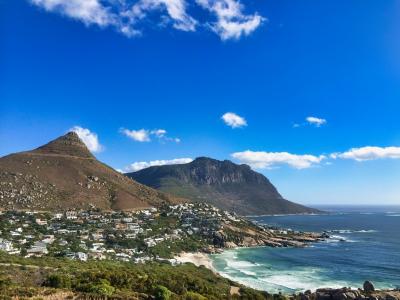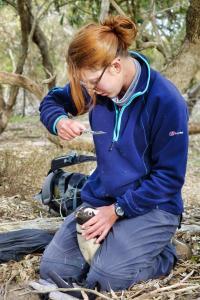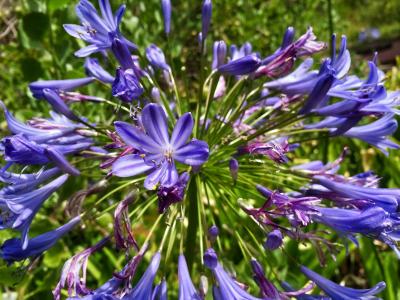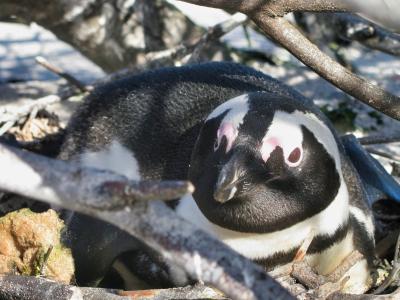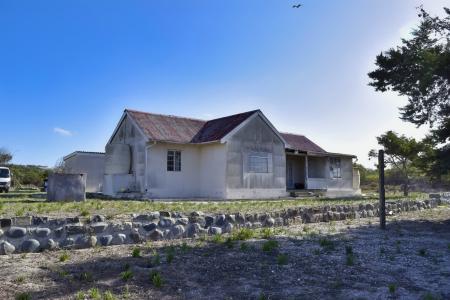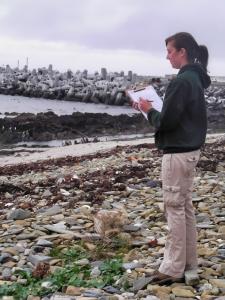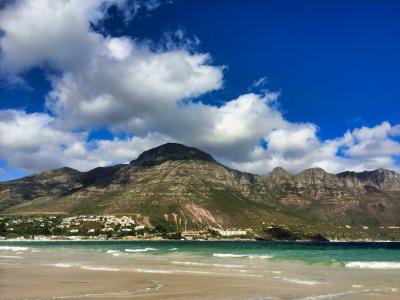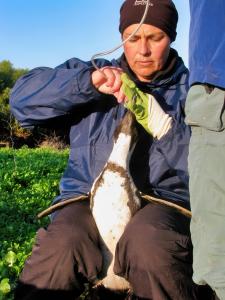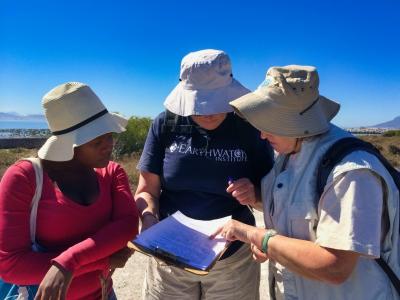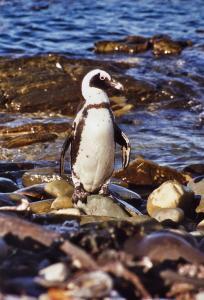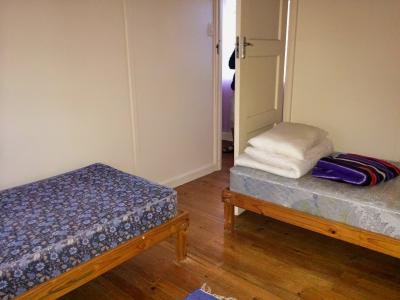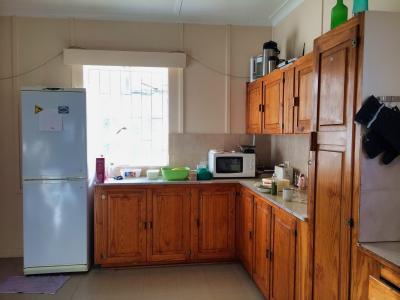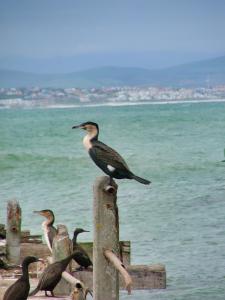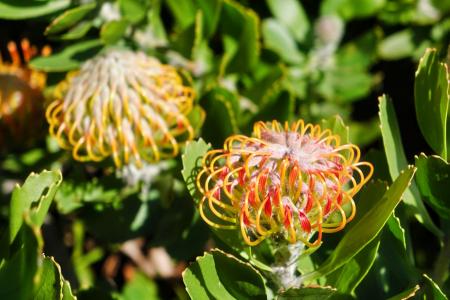Please read the following information carefully before leaving for your expedition.
South African Penguins
Expedition Briefing
Quick Navigation: COVID-19 Safety | The Research | Research Aims | How You Will Help | Life in the Field | Accommodations and Food | Project Conditions | Essential Eligibility Requirements | Health and Safety | Project Risks and Precautions | Travel Planning | Additional Resources
Click on the images to view full size!
COVID-19 Safety
You are strongly encouraged to test for COVID-19 before traveling to your expedition, particularly if you are experiencing symptoms. Do not travel if you have tested positive, and call Earthwatch right away for the next steps. Please see earthwatch.org/covid-19 for more information.
The Research
According to reports from the 1600s, African penguins were once abundant on Robben Island. However, by 1800, they had faced so much exploitation and disturbance—primarily for food, clothing, and oil by the early European settlers at the Cape—that they no longer bred there. Not until 1983 did African penguins begin to recolonize Robben Island. After that, the colony grew spectacularly, reaching over 8,000 breeding pairs in 2004 (Sherley et al. 2014), and was briefly the second-largest African penguin colony in the world around 2007.
Unfortunately, the story doesn’t end with the penguins’ recovery: the population has declined again (Sherley et al., 2020). Human activity, such as oil spills and fishing, disturbs their habitat. Not only that, changes in ocean conditions, attributable to the effects of climate change, have shifted the populations of sardine and anchovy (the penguins’ primary food resources) to the southeast of the nesting colonies (Crawford et al. 2014; Weller et al. 2014; Sherley et al. 2017a).
No one fully understands why the fish have moved, but the population of penguins on Robben Island has plummeted to ~900 breeding pairs. The birds must compete with the local fishing industry over a rapidly diminishing food supply (Sherley et al. 2018). Because of their attachment to their nesting colonies, relocating the penguins closer to the fish would require a massive effort, which may or may not work (Welz 2020). As a result of these collective threats and the continued decline of the penguin populations, the International Union for Conservation of Nature (IUCN) now classifies the species as Critically Endangered (Sherley et al. 2024).
The data collected by Earthwatch teams is critical to conserve these seabirds and bring them back from the brink of extinction. Scientists need to understand how they’re breeding, where they’re hunting for food, whether chicks are surviving, and if methods to help protect these penguins—such as setting up nest boxes, hand-rearing malnourished chicks, setting up marine protected areas, and potentially relocating entire breeding colonies—were, are, or will be, effective. At the same time, long-term monitoring data are needed to assess changes to the terrestrial and near-shore environments with which penguins interact. This research is essential to preventing the further decline of this species—and it takes time.
Research Aims
Through our research on this project, we aim to understand better the dynamics of the penguin population on Robben Island. This will help us determine the causes of the population’s rapid decline and develop well-informed strategies to increase their chances of survival. We already know a few important facts: African penguins are largely monogamous and return to the same nesting colonies year after year. Since 1989—and with the help of Earthwatch volunteers since 2001—we have collected data on the breeding success rates of the Robben Island penguins, the growth rate and overall conditions of the chicks, annual survival rates of the birds, and other features of the population (Sherley et al. 2014, 2018, Campbell et al. 2019). We relate changes in these population features from year to year to changes in environmental conditions, such as the amount of prey available, water temperatures, etc. (e.g., Campbell et al. 2019). Thus, we hope to determine which factors contribute to the penguins' decline and then develop targeted conservation measures to protect them and possibly other seabird species (Sherley et al. 2017a,b, 2018). Effectively teasing out factors related to a changing climate versus fishery harvest patterns requires robust data, drawing upon external datasets (sea temperature and fish harvest metrics) and careful observations of the penguins.
We are also developing research techniques that can benefit penguins and other birds, some of which researchers at other South African breeding colonies have already adopted. For example, we redesigned the wing bands used to identify the penguins to make them easier to read in the field and to lower the risk of harmful effects on the penguins (Barham et al. 2008). We have also carried out studies using microchips (PIT tags; Leith et al. 2022) and camera traps to monitor the birds automatically (Sherley et al. 2010).
Beginning with late 2024 or 2025 volunteer teams, we will expand our focus to trial long-term monitoring datasets on aspects of the terrestrial and near-shore ecosystems with which the penguins interact. This may include a) quantifying populations of resident mole snakes as potential predators of seabird eggs and chicks, b) surveying the intertidal environment that the penguins use to move to and from the sea, and c) assessing the state of plastic pollution (particularly microplastics) on the beaches occupied by penguins.
How You Will Help
You’ll help monitor the birds that come to breed at Robben Island from March to August. The data you help collect will be used for detailed analysis, with results submitted to the Department of Forestry, Fisheries, and the Environment to help their conservation decision-making.
Your work will involve some or all the following activities:
- Monitoring Penguin Chicks: This involves weighing chicks and taking measurements to determine their body condition.
- Monitoring Nests: You’ll visit the nests in our study regularly (every five to six days) to document the resident penguins’ behavior. You'll note the nest’s contents and the identity of adult birds present (usually using PIT tags, but occasionally by band numbers as well) and enter data into the nest-monitoring database on the project computer.
- Track penguins at sea: Volunteers on the mid-winter teams may get the opportunity to help attach cutting-edge tracking technology to penguins to learn about where they go and how hard they work at sea to find food.
- Reading Transponders: You will use a hand-held wand to check whether penguins at nests have been fitted with a PIT tag and, if so, to read and record the unique number. You may also help set up and monitor our moveable ground antenna to record PIT tag numbers from birds moving in and out of the colony on “penguin highways.”
- Reading the Numbers on Banded Penguins: You’ll read numbers on all banded penguins in the colony. This will usually be casual observations you make while involved in other activities. You’ll also help enter data in the resighting database on the project computer. Re-sightings of banded birds have already proved invaluable. For example, they show that although birds that were oiled, cleaned, rehabilitated, and released after the oil spill have similar survival rates to other birds, their breeding success has not been as good.
- Long-Term Population Monitoring of the Island's Wildlife: Besides counting the number of molting penguins and penguin nests in a small area of the colony, you’ll count other shorebirds and the game animals that call Robben Island “home.”
- Assessing Predation by Cape Fur Seals: It has been suggested that predation by fur seals may be an important contributor to the reduction in penguin numbers. You will help researchers estimate the amount of seal predation around the island by conducting observations from three fixed locations on the island in the 1.5 hours before sunset. You’ll record the number of seals observed, the number of penguins visible in the sea, and any predation events of penguins or seabirds by seals during observation periods.
- Clearing Accumulated Garbage & Surveying Plastic Pollutants*: You’ll help remove the garbage, especially fishing line, from the shoreline (likely for parts of one or two days). Animals entangled in this material can become trapped and die of starvation. Using sieves and manual collection, participants will extract micro- and macro-plastics from the beaches as part of a study aimed at identifying and quantifying primary sources of plastic pollution affecting the environment of this key penguin breeding colony.
- Conducting Intertidal Quadrat Surveys*: Working on shorelines at low tide will help quantify the abundance of key intertidal organisms, known as ‘indicator species.’ You’ll place quadrats at predefined locations and take digital photographs to assess the percent coverage of intertidal species (such as the invasive European mussel). This data will be compared with datasets generated in the 1990s to understand how the intertidal ecosystems within which penguins live have changed in the past three decades.
- Surveying Mole Snakes*: These reptiles are common seabird predators on Robben Island. You’ll help walk predetermined transects to record locations where snakes are observed, stopping along the way to count ground-nesting seabirds in the immediate area. Understanding predator populations provides a more holistic understanding of factors affecting seabird population changes.
*Beginning in late 2024 or 2025, volunteer teams, these new monitoring activities may be implemented.
Life in the Field
At the beginning of your expedition, you’ll receive an orientation of the island, meet some environmental officers at the Robben Island Museum, and visit the penguin colony to learn about research aims, methods, and data collection. You’ll also receive a thorough safety briefing on protecting yourself and the penguins you work with.
The daily program will vary during the season as the chicks develop and the parents leave the breeding site. March and April mark the beginning of the breeding season; on the April team, you’ll likely see many nests with eggs and a few with small chicks during this time. Usually, teams during these early months spend much of their time assisting in selecting nests for the study group, monitoring some of these nests, and helping with the data entry associated with setting up the nests for monitoring by later teams. In May and June, when chicks start to fledge, you’ll mainly monitor nests. These months are also when we deploy most GPS tracking devices on penguins. In July and August, birds complete their breeding season, and many abandon their nests. During this time, we generally find the greatest number of birds that need attention because of injury or oiling (winter storms mean that oiling seems to happen most in July and August). Teams in August generally find fewer breeding birds and are involved in closing down the project for the year and ensuring all data entry is up-to-date and accurate.
ITINERARY
Weather and research needs can lead to changes in the daily schedule. We appreciate your cooperation and understanding.
- Day 1—Rendezvous: Volunteers will meet at the V&A Waterfront in Cape Town on Day 1. Refer to your Expedition Logistics Document for specific information about when to meet your team. After a short briefing on the schedule, the group will board the ferry for Robben Island.
Please Note: The tourist ferry schedule is subject to change, which may delay the group’s transfer to Robben Island. If the ferry is delayed or canceled, field staff will implement contingency plans and facilitate the group catching the next available ferry.
- Days 2–5 & 8–11—Fieldwork:
- 6:00–7:00 a.m.: Wake up and eat breakfast
- 8:00–9:00 a.m.: Begin morning fieldwork (monitoring nests, etc.)
- 12:30 p.m.: Return to house for lunch
- 3:00 p.m.: Afternoon fieldwork (afternoon activities tend to be fairly diverse)
- 6:00 p.m.: Prepare dinner
- 7:00 p.m.: Dinner
- 8:00 p.m.: Recap of day’s observations and briefing for the following day’s work; assist with data entry
- 9:00 p.m.: Occasional evening fieldwork
- 10:00 p.m.: Suggested bedtime
- Days 6 & 7—*Recreational Days: Volunteers may leave the island overnight in Cape Town (weather permitting) and participate in recommended tours and activities. Volunteers may also remain on the island to rest or explore the island’s natural and cultural heritage sites.
*If you intend to spend the night in Cape Town, you must arrange and pay for accommodations for this night and any meals and activities separately. Project staff will provide a list of recommended activities vetted by Earthwatch (likely to include a ‘hop-on, hop-off’ city bus tour or a visit to Kirstenbosch National Botanical Garden). Should you wish to overnight in Cape Town or to participate in activities apart from those that have been recommended, you will be required to ‘sign out’ of the project by completing a Recreational Activity Release. Day trips to Cape Town may be possible, but this would give you very limited time on the mainland due to current ferry schedules. The exact days provided as recreational days may vary depending on the work requirements and the weather.
Scuba Policy: Please note that scuba diving is not permitted on the recreational day(s); if you would like to dive during your visit to Cape Town, please do so before or after your Earthwatch expedition.
- Day 12—Departure: Volunteers will leave the island sometime on the last day, normally during the morning, depending on the ferry schedules and weather. If time allows, volunteers will clean up the house before departing.
Please Note: Because the ferry schedule can be sporadic and return to the mainland can be delayed, we strongly recommend that participants plan to spend the night in Cape Town after the expedition concludes. You must arrange and pay separately for your meal and accommodations for this night. The meal and the night’s lodging are not included in the cost of your expedition.
Money Matters
LOCAL CURRENCY
South African Rand
PERSONAL FUNDS
Before you arrive, you may wish to convert the equivalent of 50 USD to South African Rand for personal expenditures. Most establishments in South Africa accept credit cards. Tipping of 10–12% is expected at restaurants and cafes.
Accommodations and Food
* Please note that not every expedition has couples’ or singles' accommodations available. Please call or email Earthwatch to check availability before reserving your space(s) on the team.
SLEEPING
The house is a small, basic field center with five bedrooms. Team members will stay in shared rooms. The house is old and not centrally heated, and nights can sometimes be cold, so bring an extra sleeping layer if you tend to get chilly at night. The house is also home to the SANCCOB Penguin Field Ranger.
* Earthwatch will respectfully and without judgment honor each person’s assertion of gender identity. For both teen and adult teams, where logistics dictate single-sex accommodations or other facilities, participant placements will be made in accordance with the gender identity the participant specified on their Earthwatch Participant form and/or preferences indicated in discussions with Earthwatch.
BATHROOMS
The house has one bathroom with one flush toilet and hot and cold running water from a large-scale desalination system. There is also an additional separate toilet. Laundry facilities (a washing machine and a small air dryer) are available at the house for free. Bedding is provided. You must bring a bath towel.
ELECTRICITY
Robben Island has a fairly reliable 240-volt power supply and uses South African sockets (a three-pin plug is required). Adaptors are necessary for North American, Australian, British, and European plugs. Adaptors can be purchased at stores in Cape Town, and there may be a spare one at the house for general use. North American electronics (excluding laptop computers) may also require a transformer to protect the equipment from the higher voltage in South Africa.
PERSONAL COMMUNICATIONS
The house does not have a broadband connection. However, volunteers may send and receive limited emails via the team leader and/or the assistant if needed. South Africa has 4G cellular Internet (5G in major cities). Local ‘pay as you go’ SIM cards, phones (which can work as a portable hotspot), and ‘dongles’ can be purchased or rented on arrival in Cape Town at the airport and some outlets at the Waterfront. You will need to show your passport to register a SIM card and phone number. If you have a quad-band phone, which can work as a portable hotspot, you may be able to use it in South Africa. eSIMs can be purchased online before traveling and will work in South Africa. To avoid roaming charges, buy a local SIM card and a ‘data bundle’ (SIM cards should not cost more than R10; data packages are extra). Some North American phones may not work. There is reasonable but sometimes patchy cell phone reception (including 4G coverage) on Robben Island.
Please note: Earthwatch encourages volunteers to minimize outgoing calls and immerse themselves in the experience; likewise, family and friends should restrict calls to urgent messages only. Emergency communications will be prioritized.
DISTANCE TO THE FIELD SITE
The house is about a 15-minute walk from the edge of the penguin colony and about 30 minutes from the main study site.
FOOD AND WATER
The following are examples of foods you may find in the field. Variety depends on availability. We appreciate your flexibility.
- Breakfast: This is usually do-it-yourself and includes toast, cereal, yogurt, and fruit.
- Lunch: Cold meats, cheese, quiche, bread, salads, and fruit.
- Dinner: Each team normally has at least one braai (South African for barbecue) with traditional meats. Other dinners include fish, stews, and pasta dishes. Enough fresh vegetables to last a week are sent out with the team, and the supply is replenished when possible.
- Snacks: A good range of biscuits (cookies) and savory snacks are provided.
- Beverages: Tea (leaf tea, tea bags, herbal teas, and rooibos, a South African specialty), coffee, hot chocolate, fruit juices, and other beverages will be provided. Drinking water from a desalination plant on the island will be provided.
SPECIAL DIETARY REQUIREMENTS
Please alert Earthwatch to any special dietary requirements (e.g., diabetes, lactose intolerance, nut, other food allergies, vegetarian or vegan diets) as soon as possible, and note them in the space on your volunteer forms.
Accommodating special diets is not guaranteed and can be very difficult due to the availability of food, the location of field sites, and other local conditions.
Project Conditions
GENERAL CONDITIONS
Please visit wunderground.com and search for your project location for weather and region-specific information.
Essential Eligibility Requirements
All participants must be able to:
- Walk between 4 km/2.5 miles and 8 km/5 miles daily on rough dirt tracks and through dense woodland to monitor the nests, etc. Some volunteers also choose to walk to and from the research house to the field site, 2.5 km/1.5 miles per trip.
- Bend up and down, crouch, and crawl comfortably for two hours daily while performing nest work.
- Traverse wet, slippery, rocky, or seaweed-covered terrain while conducting intertidal surveys.
- Sit for up to 2 hours daily for several days in a row while recording data.
- Have strong eyesight to use binoculars and spotting scopes to read band numbers (contacts and glasses are OK).
- Carry personal daily supplies such as water, notebook, binoculars, and occasionally some field equipment, such as a spotting scope or tripod.
- Follow verbal and/or visual instructions independently or with the assistance of a companion.
- Take an active role in your safety by recognizing and avoiding hazards if and when they arise (including, but not limited to, those described in Earthwatch materials and safety briefings). Always comply with project staff instructions and recommended safety measures.
- Be able to effectively communicate to the staff if you are experiencing distress or need assistance.
- Be able to get along with a variety of people from different backgrounds and ages, often in close proximity, for the duration of your team.
- Be comfortable surrounded by a language and/or culture different from yours.
- Enjoy being outdoors most of the day in variable weather in the potential presence of wild animals and insects.
- Tolerate moderate to very hot conditions in direct sun for long hours each day (especially for April and May teams).
Health and Safety
EMERGENCIES IN THE FIELD
Earthwatch has a 24-hour, 7-day-a-week emergency hotline number. Someone is always on call to respond to messages that come into our live answering service.
IMMUNIZATIONS & TRAVEL VACCINATIONS
Please be sure your routine immunizations are up to date (for example, diphtheria, pertussis, tetanus, polio, measles, mumps, rubella, and varicella) and that you have the appropriate vaccinations for your travel destination. Medical decisions are the responsibility of each volunteer and their doctor. Visit the Center for Disease Control and Prevention or the World Health Organization for guidance on immunizations.
If traveling from countries or regions where yellow fever is endemic, you must have a certificate of vaccination.
It is strongly encouraged that you stay up to date with your COVID-19 vaccinations, including receiving booster doses, as applicable.
Project Risks and Precautions
TRANSPORTATION
The ferry ride to the island takes up to 45 minutes each way. Bring appropriate medication if you are prone to seasickness. Traveling to and from the island by ferry highly depends on weather and other factors. Poor weather conditions and unanticipated ferry schedule changes can delay arrival on the island or can require us to leave the island a day or more early. This is a particular risk during winter months (June—August).
On the island, you’ll ride in a bakkie (small pickup), often in the back of the truck without safety restraints. Stay seated on the truck bed floor and always hold on to the sides. Participants are not permitted to drive.
HIKING
You will usually walk on dirt roads and tracks with reasonably flat surfaces. However, you may have to navigate penguin burrows or loose stones elsewhere. Please walk slowly and carefully over uneven terrain. If you are unsure about footing, we advise using a walking stick or hiking pole to avoid slipping and injury.
You’ll find rusty barbed wire (remnants from the prison) throughout parts of the colony. Please pay attention to your surroundings and be sure your tetanus vaccination is up to date before you arrive. Wear long pants and appropriate footwear (e.g., hiking boots) to avoid scratches when walking through long brush and grass. Some tasks are done along the shoreline, which means walking on rocks, loose stones, or sand.
INTERTIDAL SURVEYS
Participants may walk on rocky shorelines to survey intertidal organisms in the near-shore environment. When traversing rocky, slippery terrain, slips, trips, and falls are possible. Participants are advised to maintain awareness of their surroundings and wear close-toed water shoes with good grip to avoid slipping.
ANIMALS
Project staff will instruct you on proper handling techniques to avoid injury to yourself or any animals present. Penguins can inflict painful bites, so we will provide protective gloves. Always take care and wear goggles when handling penguins; if frightened, penguins may attempt to peck your hand, arms, face, or eyes.
Mole snakes inhabit some parts of the island and may be surveyed by late 2024 or 2025 by volunteer teams as an aspect of the overall research objectives. While mole snakes are non-venomous and generally docile, they are large animals and may bite painfully. Under no circumstances should you disturb or attempt to handle them. Participants with a phobia of snakes may not be well-suited to this activity.
Wild African bees also live on the island. If you are allergic to stings, you must note this on your Earthwatch Participation Form and inform project staff in the field. Please also carry the necessary medications and inform staff of their location.
CLIMATE/WEATHER
Most project work happens outdoors, so sunburn, dehydration, and other heat-related illnesses are risks. Please wear high-factor sunscreen, dress appropriately, and wear a wide-brimmed hat and sunglasses. Carry and drink plenty of water throughout the day. Take rest breaks as needed and inform a staff member if you feel tired or ill.
BUSH FIRE
Vegetation on the island is very dry, especially from March to May, so there is a high risk of bushfires due to careless behavior, such as smoking in the veld (open areas covered with scrub and grasses). Project staff will instruct you on how to avoid this risk. Smoking is prohibited in the field or the team house; smoking is permitted only in designated areas outside the house.
PERSONAL SECURITY
If you will be traveling in urban areas in South Africa before and/or after the expedition, we advise you to stay alert and use sensible precautions. Avoid dark areas, don’t walk alone at night, and do not display cash, cameras, or jewelry. It is always good practice to leave any unnecessary valuables at home.
DISTANCE FROM MEDICAL CARE
The ferry to and from Robben Island highly depends on weather and other factors. Poor weather conditions and a sporadic ferry schedule can lead to delays in access to medical care. If you have a chronic condition that may require immediate medical care (e.g., heart conditions, kidney problems, severe asthma, etc.), or if you are pregnant, please discuss your participation on this expedition with your physician. The hospital on the mainland is approximately 10 km away; 25 minutes by helicopter (may not always be available), longer by boat (approx. 90 minutes once onboard). Both take time to arrange.
DISEASES
Diseases found in South Africa may include hepatitis, schistosomiasis, trypanosomiasis, filariasis, leishmaniasis, chikungunya, Rift Valley fever, tick bite fever, dengue, West Nile virus, brucellosis, rabies, HIV/AIDS, tuberculosis, cholera, plague, and typhoid. Please see the U.S. Centers for Disease Control and Prevention (cdc.gov) or the World Health Organization (who.int) websites for more information on these conditions and how to avoid them.
RISK OF COVID-19 OR OTHER RESPIRATORY ILLNESS
Earthwatch strongly encourages you to take precautions to help protect yourself and others from common viral respiratory illnesses, including COVID-19, flu, and RSV: stay up to date with your vaccinations; wash your hands frequently; take steps to improve air quality, for example, by increasing ventilation indoors or gathering outdoors; and use preventative measures to limit the spread if you are sick.
Persons with a higher risk of severe respiratory illness should consult their healthcare provider before participating.
Participants exhibiting signs of illness may be asked to isolate according to local and/or CDC guidelines. Depending on room availability at project accommodations, this may entail returning to mainland Cape Town to overnight in a local hotel.
Travel Planning
RENDEZVOUS LOCATION
Clock tower at the Nelson Mandela Gateway, V&A Waterfront, Cape Town, South Africa
Note: To ensure arrival well ahead of the rendezvous on Day 1, participants must book flights arriving in Cape Town at least one day before the start of their expedition. Similarly, outbound flights must be booked no sooner than the day after the expedition ends to account for possible ferry delays. The participant is responsible for the costs associated with these additional nights’ accommodation.
Specific travel planning details will be provided in your Earthwatch Expedition Logistics Document. This document can be found in your MyEarthwatch Portal once you enroll. Please do not book travel arrangements—such as flights—until the Expedition Logistics Document matching the current year has been published to your portal account.
ABOUT YOUR DESTINATION
Earthwatch strongly recommends that travelers investigate their destination before departure. Familiarity with the destination’s entry/exit requirements, visas, local laws, and customs can ensure smooth travel. The U.S. Department of State's Traveler’s Checklist and Destination Guides are helpful resources. For LGBTI travelers, the U.S. Department of State's LGBTI Travelers page contains many helpful tips and links.
COUNTRY AND PROJECT ENTRY REQUIREMENTS
You are responsible for reviewing and abiding by your destination's entry/exit requirements.
Entry visa requirements differ by country of origin, layover, and destination and do change unexpectedly. For this reason, please confirm your visa requirements at the time of booking and again 90 days before travel. Please apply early for your visa (we recommend starting six months before the start of your expedition). Refunds will not be made for volunteers who cancel due to not obtaining their visa in time to meet the team at the rendezvous. You can find up-to-date visa requirements at the following website: travisa.com.
If a visa is required, participants should apply for a TOURIST visa. Please note that obtaining a visa can take weeks or even months. We strongly recommend using a visa agency to expedite and simplify the process.
Resources
RESEARCH ARTICLES
- Sydeman WJ, et al. 2021. South Africa’s experimental fisheries closures and recovery of the endangered African penguin. ICES Journal of Marine Science 78: 3538–3543.
- Sherley RB, et al. 2020. The conservation status and population decline of the African penguin deconstructed in space and time. Ecology and Evolution 10: 8506–8516.
- Ropert-Coudert et al. 2019. Happy Feet in a hostile world? The future of penguins depends on proactive management of current and predictable threats. Frontiers in Marine Science 6:248.
- Cury PM et al. 2011. Global seabird response to forage fish depletion—One-third for the birds. Science 334: 1703–1706.
POPULAR ARTICLES
- Trenchard T. 2022. As African Penguins Go Hungry, a Debate Rages in South Africa: Who Gets the Fish? Hakai Magazine.
- Welz A. 2020. Decoy tactics: can fake concrete penguins help save the real thing? The Guardian.
- Peek K. 2018. Misled Penguins Swim to Feeding Grounds That No Longer Have Food. Scientific American (see also the Scientific American 60-second Science Podcast about this research here).
- Sherley RB. 2014. Adult survival declines as African Penguin population plummets. BOU Blog
- Bergman C 2012. Make way for the African Penguins. Smithsonian Magazine.
- Sherley RB et al. 2011. Birds occurring or breeding at Robben Island, South Africa, since 2000. Ornithological Observations 2: 69–100.
BOOKS
- Mandela, Nelson. Long Walk to Freedom. New York: Little Brown and Co., 1995.
- Garcia Borboroglu, Pablo and Boersma, P Dee. Penguins: Natural History and Conservation; University of Washington Press, 2013
- Whittington, Phil. Peter the Penguin. Cape Town: Animal Demography Unit, 2001.
- Spencer David, Lloyd. Penguins: The Ultimate Question and Answer Book. New York: Harper Collins, 2007.
- Bergman, Charles. Every Penguin in the World. Seattle: Sasquatch Books, 2020.
FIELD GUIDES
- Sinclair, Ian, Phil Hockey, Warwick Tarboton, Niall Perrins, Dominic Rollinson and Peter Ryan. Sasol Birds of Southern Africa, 5th Edition. Cape Town: Penguin Random House, 2022.
- Branch, George, Charles Griffiths, Margo Branch, and Lynnath Beckley. Two Oceans: A Guide to the Marine Life of Southern Africa (4th Edition). Cape Town: Struik Publishers, 2017.
FILM
- “Penguin Town”. Red Rock Films, 2021. Note: a documentary, narrated by Patton Oswalt, about the life and times of the penguins that live around Boulders Beach in Simon’s Town,
- “Penguins: Spy in the Huddle.” BBC Home Entertainment, 2014. Note: a documentary using 50 ‘spy cams’ to capture unique footage of emperor, rockhopper, and Humboldt penguins; available at Amazon.com.
- “City Slickers.” Note: This is not the Billy Crystal movie but “a wonderful wildlife film with a very humorous twist”; it is available at sanccob.co.za/.
- “Mandela: Long Walk to Freedom” (Director: Justin Chadwick). Anchor Bay, 2014. Note: Based on Nelson Mandela’s 1995 autobiography of the same name. Includes some scenes filmed on Robben Island; available at Amazon.com
- “Goodbye Bafana” (Director: Billie August). Image Entertainment, 2008. Note: Based on a book of the same name, it tells the story of an unlikely friendship between a former prison guard at Robben Island and Pollsmoor Prison—James Gregory— and one of his prisoners, Nelson Mandela, available at Amazon.com and renamed The Color of Freedom in the U.S.A.
- “Invictus” (Director: Clint Eastwood). Warner Home Video, 2010. Note: Based on newly post-Apartied South Africa’s famous victory on home soil in the 1995 Rugby World Cup and the interactions between then Springbok captain Francois Pienaar and Nelson Mandela. It includes some scenes filmed on Robben Island and is available on Amazon.com.
PROJECT–RELATED WEBSITE
- Robben Island Penguins on Twitter (@RobbenPenguins)
- Robben Island Penguins on Instagram (@RobbenPenguins)
- SANCCOB
- Richard Sherley’s Research Website
LITERATURE CITED
- Barham PJ, Underhill LG, Crawford RJM, Leshoro TM, and Bolton DA. 2008. Impact of flipper-banding on breeding success of African penguins Spheniscus demersus at Robben Island: comparisons among silicone rubber bands, stainless-steel bands, and no bands. African Journal of Marine Science. 30: 595-602.
- Campbell KJ, Steinfurth A, Underhill LG, Coetzee JC, Dyer BM, Ludynia K, Makhado AB, Merkle D, Rademan J, Upfold L, and Sherley RB. 2019. Local forage fish abundance influences foraging effort and offspring condition in an Endangered marine predator. Journal of Applied Ecology 56: 1751–1760
- Crawford RJM, Makhado AB, Waller LJ, and Whittington PA. 2014. Winners and losers -responses to recent environmental change by South African seabirds that compete with purse-seine fisheries for food. Ostrich 85: 111-117.
- Leith F, Grigg JL, Barham BJ, Barham PJ, Ludynia K, McGeorge C, Mdluli A, Parsons NJ, Waller LJ, and Sherley RB. 2022. Intercolony variation in reproductive skipping in the African penguin. Ecology and Evolution 12: e9255.
- Sherley RB, Burghardt T, Barham PJ, Campbell N, and Cuthill IC. 2010. Spotting the difference: towards fully automated population monitoring of African penguins Spheniscus demersus. Endangered Species Research 11: 101-111.
- Sherley RB, Barham PJ, Barham BJ, Crawford RJM, Dyer BM, Leshoro TM, Makhado AB, Upfold L and Underhill LG. 2014. Growth and decline of a penguin colony and the influence on nesting density and reproductive success. Population Ecology 56: 119–128.
- Sherley RB, Ludynia K, Dyer BM, Lamont T, Makhado AB, Roux J-P, Scales KL, Underhill LG, and Votier SC. 2017a. Metapopulation tracking juvenile penguins reveals an ecosystem-wide ecological trap. Current Biology 27: 563–568.
- Sherley RB, Botha P, Underhill LG, Ryan PG, van Zyl D, Cockcroft AC, Crawford RJM, Dyer BM and Cook TR. 2017b. Defining ecologically relevant scales for spatial protection with long-term data on an endangered seabird and local prey availability. Conservation Biology 31: 1312–1321.
- Sherley RB, Barham BJ, Barham PJ, Campbell KJ, Crawford RJM, Grigg J, Horswill C, McInnes A, Morris TL, Pichegru L, Steinfurth A, Weller F, Winker H and Votier SC. 2018. Bayesian inference reveals positive but subtle effects of experimental fishery closures on marine predator demographics. Proceedings of the Royal Society B: Biological Sciences 285: 20172443.
- Sherley RB, Crawford RJM, de Blocq AD, Dyer BM, Geldenhuys D, Hagen C, Kemper J, Makhado AB, Pichegru L, Tom D, Upfold L, Visagie J, Waller LJ and Winker H. 2020. The African penguin's conservation status and population decline deconstructed in space and time. Ecology and Evolution 10: 8506–8516.
- Sherley RB, Makhado AB, Crawford RJM, Hagen C, Kemper J, Ludynia K, Masotla MJ, McInnes A, Pichegru L, Tom D, Upfold L and Waller LJ. 2024. The African Penguin should be considered Critically Endangered. Ostrich: In Press.
- Weller F, Cecchini L-A, Shannon L, Sherley RB, Crawford RJM, Altwegg R, Scott L, Stewart T and Jarre A. 2014. A system dynamics approach to modeling multiple drivers of the African penguin population on Robben Island, South Africa. Ecological Modeling 277: 38–56.
Sign up for the Earthwatch Newsletter
Be the first to know about new expeditions, stories from the field, and exciting Earthwatch news.
.
.
.
